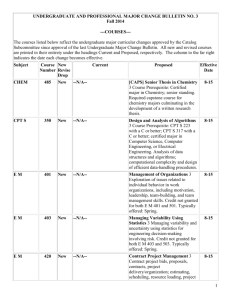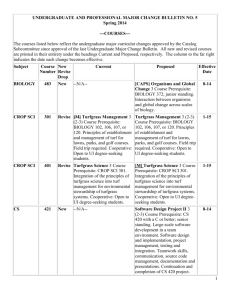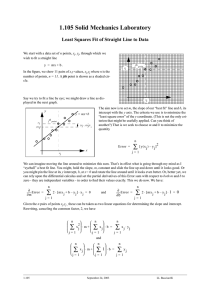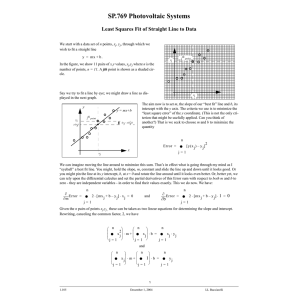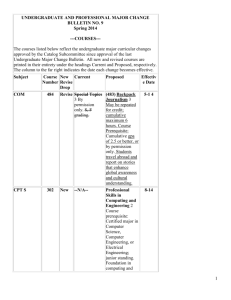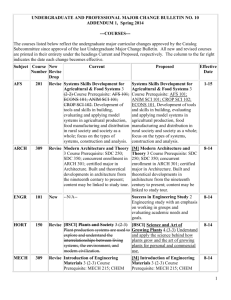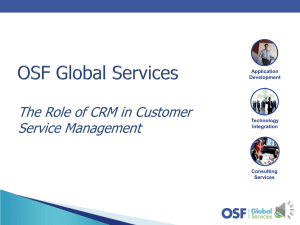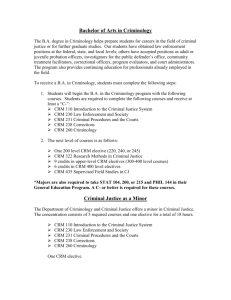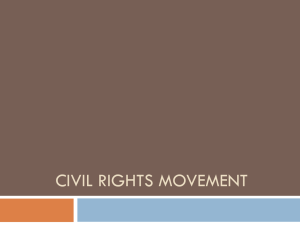Exhibit G
advertisement
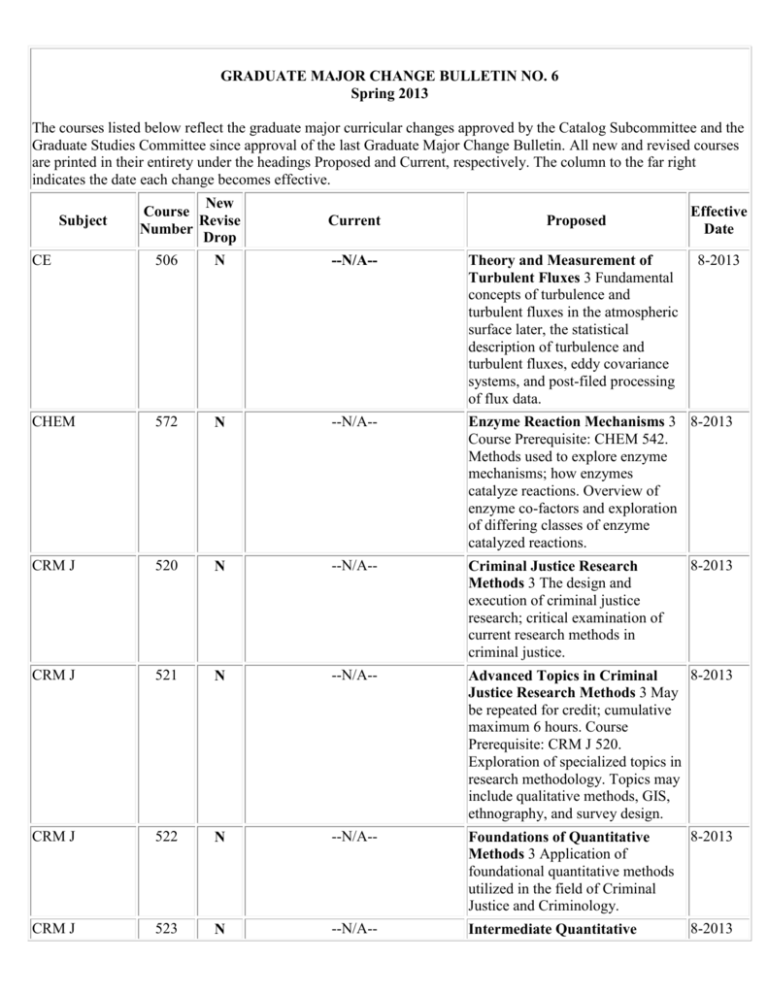
GRADUATE MAJOR CHANGE BULLETIN NO. 6 Spring 2013 The courses listed below reflect the graduate major curricular changes approved by the Catalog Subcommittee and the Graduate Studies Committee since approval of the last Graduate Major Change Bulletin. All new and revised courses are printed in their entirety under the headings Proposed and Current, respectively. The column to the far right indicates the date each change becomes effective. Subject CE New Course Revise Number Drop 506 N Current Proposed --N/A-- Theory and Measurement of Turbulent Fluxes 3 Fundamental concepts of turbulence and turbulent fluxes in the atmospheric surface later, the statistical description of turbulence and turbulent fluxes, eddy covariance systems, and post-filed processing of flux data. Effective Date 8-2013 CHEM 572 N --N/A-- Enzyme Reaction Mechanisms 3 8-2013 Course Prerequisite: CHEM 542. Methods used to explore enzyme mechanisms; how enzymes catalyze reactions. Overview of enzyme co-factors and exploration of differing classes of enzyme catalyzed reactions. CRM J 520 N --N/A-- Criminal Justice Research Methods 3 The design and execution of criminal justice research; critical examination of current research methods in criminal justice. CRM J 521 N --N/A-- 8-2013 Advanced Topics in Criminal Justice Research Methods 3 May be repeated for credit; cumulative maximum 6 hours. Course Prerequisite: CRM J 520. Exploration of specialized topics in research methodology. Topics may include qualitative methods, GIS, ethnography, and survey design. CRM J 522 N --N/A-- Foundations of Quantitative Methods 3 Application of foundational quantitative methods utilized in the field of Criminal Justice and Criminology. 8-2013 CRM J 523 N --N/A-- Intermediate Quantitative 8-2013 8-2013 Methods 3 Course Prerequisite: CRM J 522. Intermediate-level quantitative methods including logistic regression, factor analysis, propensity scoring and model building. CRM J 524 N --N/A-- Advanced Topics in Quantitative 8-2013 Methods 3 May be repeated for credit; cumulative maximum 6 hours. Course Prerequisite: CRM J 523. Advanced quantitative methods used in criminal justice, including time series, HLM, multilevel modeling, spatial analysis, and repeated measures analysis. CRM J 593 N --N/A-- Special Topics in Criminological 8-2013 Theory 3 May be repeated for credit; cumulative maximum 6 hours. Intense examination of a contemporary criminological theory, school, or paradigm. CRM J 594 N --N/A-- Special Topics in Comparative Criminology and Criminal Justice 3 May be repeated for credit; cumulative maximum 6 hours. Intensive study of specific topics in comparative criminal justice or criminology. CRM J 595 N --N/A-- 8-2013 Advanced Topics in Criminal Justice Institutions and Processes 3 May be repeated for credit; cumulative maximum 6 hours. In depth study of issues associated with criminal justice institutions and processes. CRM J 596 N --N/A-- Special Topics: Criminal Justice 8-2013 and Public Health 3 May be repeated for credit; cumulative maximum 6 hours. Examination of public health ramifications of criminal justice policy and practice; public health approaches to violence and substance abuse prevention. EE 525 N --N/A-- 8-2013 Power System Applications of Power Electronics 3 Course Prerequisite: E E 521. Principles of operation of power electronic converters in modern power 8-2013 systems; FACTS, HVDS, microgrids, integration of renewables, modeling and control. EE 536 N --N/A-- 8-2013 Power Systems Economics and Electricity Markets Economic Dispatch and Optimal Power Flow, electricity Market, Short-Term Load Forecasting, Electricity Price Forecasting, Price-Based Unit Commitment, Arbitrage in Electricity Markets, Market Power Analysis. HISTORY 595 R The Teaching of History in College V 1-2 May be repeated for credit; cumulative maximum 5 hours. Theory, problems, and methods of teaching history at the college level. Teaching of History in College 3 8-2013 Theory, problems, and methods of teaching history at the college level. MATH 531 R Intersections of Culture and Mathematics 3 (2-2) Gender/race/ethnicity differences; social consequences; cultural influences on development and learning of mathematics; role of women, people of color in mathematics. Credit not granted for both MATH 431 and MATH 531. Offered at 400 and 500 level. 1-2014 Intersections of Culture and Mathematics 3 Gender/race/ethnicity differences; social consequences; cultural influences on development and learning of mathematics, role of women, people of color in mathematics. Credit not granted for both MATH 431 and MATH 531. Offered at 400 and 500 level. ME 516 N --N/A-- Micro/Nanoscale Thermal Engineering 3 Fundamentals and applications of micro/nanoscale thermal science and engineering. 1-2014 ME 529 N --N/A-- Experimental Methods for Mechanical Engineering Research 3 Research methods for mechanical engineers, including experimental design, techniques, analysis, and presentation. 8-2013 MGTOP 556 N --N/A-- Advanced Business Modeling 3 8-2013 Course Prerequisite: Admission to the MBA, Master of Accounting, or Business PhD programs. Spreadsheet modeling and solution of business problems using mathematical programming. Monte Carlo simulation, queuing theory, and decision analysis. MKTG 555 N --N/A-- Marketing Analytics 3 Course Prerequisite: Admission to the 8-2013 MBA, Master of Accounting, or Business PhD programs. Development of marketing analytics skills utilizing large data sets to identify marketing and consumer trends in online and offline markets. PSYCH 510 N --N/A-- 8-2013 Introduction to Online Instruction 1 Course Prerequisite: Ph. D student in Psychology. Instruction in teaching online courses addressing issues faced by instructors and students. Students are mentored while teaching online. S, F grading. PSYCH 542 N --N/A-- Child and Adolescent Psychopathology 3 Theoretical and empirical approaches to etiology and diagnosis of mental disorders in children. SOC 582 N --N/A-- Social Movements 3 Theories and 5-2013 methods in social movement studies. SPED ED 596 R Seminar in Quality Indicators for Research in Special Education 1 Co-requisite for research courses offered to all doctoral students. Recommended preparation: Admission to a doctoral program. Seminar in Quality Indicators for 1-2014 Research in Special Education 1 May be repeated for credit; cumulative maximum 3 hours. Course Prerequisite: Doctoral standing. Examines quality indicators of research designs and approaches in special education. 8-2013
